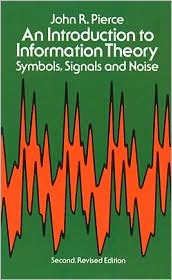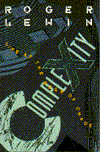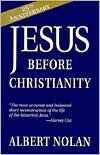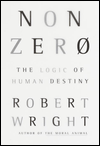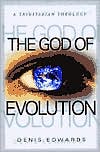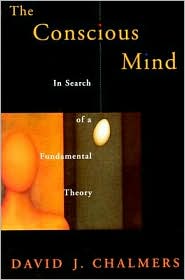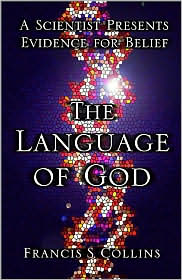Though it is but loosely related, this post is the fifth in my series on William A. Dembski's
Intelligent Design: The Bridge Between Science and Theology. The previous post in the series was
Grounding Faith in Reality? (I.D. IV).
In
Standpoint and Fact and in
Randomness by Observership?, I have been trying to extend an idea I took up in
Genesis by Observership, over in my
A World of Doubt blog. Namely, that there is something about the sheer act of observation that makes the world what it is. This is an idea that physicist John Archibald Wheeler has called "genesis by observership." Now I would like to modify it slightly and extend it as, first, "genesis by accordance," and later as "genesis by witness."
As a noun,
accordance can mean the act of granting. As a verb,
accord can mean, says the Merriam-Webster Dictionary, "to grant or give especially as appropriate, due, or earned." I apply these words in a way I can best illustrate by reference to Schrödinger's cat.
 |
Erwin Schrödinger,
as depicted on the
Austrian 1000 Schilling
bank note |
Erwin Rudolf Josef Alexander Schrödinger (see
this Wikipedia article) was a pioneer quantum physicist who devised a
paradoxical thought experiment about a cat hidden from view in a sealed box. In the box with the cat is a mechanism that will release a poison gas and kill the cat, but only if a particular quantum event — the decay of a radioactive nucleus — takes place.
After an amount of time elapses that makes the probability of nuclear decay equal to (say) 0.50, when we open the box, the cat is either dead or alive. But which result occurs is, according to the laws of quantum mechanics, apparently determined only when the box is opened. That is, the laws of physics model reality in such a way that the
post facto act of observation si the only thing that crystallizes the prior quantum potentiality into actuality. Or, in my terms, we accord an earlier event of radioactive decay the status of reality by (and only by) observing its consequences.
Similarly, in a J. A. Wheeler thought experiment I mentioned in my earlier posts, we accord the status of actuality to the arrival of a photon from a distant quasar along one of two equiprobable paths by observing, through a telescope, one path (call it Path A) to the exclusion of the other (Path B). Photon behavior, like radioactive behavior, involves quantum potentialities. We turn such a potentiality into an actual event by — even after the event has supposedly occurred — observing the event or its consequences. In so doing, we accord the (earlier) event the status of existence!
So, at least in my view, Wheeler's "genesis by observership" might well be called "genesis by accordance." We accord actual existence to certain phenomena by observing their consequences. In so doing, we
create aspects of our own reality.
 |
John
Archibald
Wheeler |
There is another sense of accord/
accordance which bolsters this notion that "genesis by accordance" might better describe "genesis by observership."
Accord is a synonym for
agreement. Now, in the experiment of Schrödinger's cat there is the implicit assumption that when the box is opened before
two or more witnesses, all witnesses will agree as to whether the cat is dead or alive. If the cat is dead, all present will accord the triggering quantum event of radioactive decay the status of earlier having occurred. The universe will not suddenly split in two at the unveiling, with the decay event existing in one part's history and not existing in the other.
Likewise, if we imagine the telescope in the Wheeler experiment as recording photon arrivals photographically, it is not the case that one observer will see the record of the Path A photon and one not.
In other words, observership in these cases
implies accordance, in both senses of the word. In sense one, observational "accordance" of the status of existence to a particular event
establishes that event's actuality — even, oddly enough, after the fact. In sense two, all observers are "of one accord" about the ontological status of the event.
 |
George
Spencer-Brown |
This idea of "genesis by accordance" can be moved from the quantum realm to the realm of random events. The first step is to recognize, as I mentioned in my earlier posts, that per the theories of mathematician-philosopher George Spencer-Brown, randomness is not so much a hard fact as a status accorded to an event or a sequence of events by us as observers.
Examples of so-called random events include coin flips, die rolls, and, as the basis for biological evolution, genetic mutations. Taken singly or in sequence, we accord these events the status of not being "ordinarily caused" — though they may have hidden causes which determine which way (say) the coin lands, we are not privy to those causes or influences. So we accord randmoness as a status to said event or events, and content ourselves with looking for laws of probability that they can be expected to adhere to over the very long run.
In much the same way, quantum events — whether a nucleus decays, whether a photon follows Path A or Path B — are not "ordinarily caused." We cannot examine a chain of causality which explains them comprehensibly.
In fact, for all we know, coin flips, die rolls, and genetic mutations may be at the mercy of quantum uncertainties per se, and the two categories are really one.
All we really know is that we
observe random events as being random, inexplicable, unpredictable, undirected, and so on.
And even though we disagree over such questions as whether randomness is an objective or purely subjective attribute of these events, we are united in calling the events random. The word
accordance applies here, too, in both its senses.
The event itself — say, a coin flip — is unremarkable. But the randomness of events is an
attribute that we also observe and remark upon, if (in G. Spencer Brown's terms) we are "bamboozled" by the events themselves. That is, if we try with all our might to find a formula by which a certain sequence of events can have been generated deterministically, and we fail, then the events
become random for us. Barring the discovery of an explanatory algorithm, we are furthermore of one accord about this: the events happened at random.
In my view, it is an act of "genesis by accordance" which makes random events
qua random events random.
On the other hand, if we discover a hidden rule or formula which accounts for the supposedly random events, it is as if we have switched telescopes in the Wheeler thought experiment. Now, all of a sudden, that photon actually took Path B. Now, all of a sudden, that series of supposedly random events was actually deterministic.
It is my contention that this situation is not merely epistemological, it is ontological. It is not merely a matter of what did we know and when did we know it. It is rather a matter of our knowledge, observation, and, most importantly, accordance
granting being. Recognizing this is the second step in moving "genesis by accordance" from the quantum realm to the realm of random events.
In the case of events that we consider
possibly random,
possibly not, there are actually two categories: random, and not random. I am suggesting that which category an event is actually in ultimately depends — quite counterintuitively, quite against everything our common sense tells us — on which status we accord it!
Just as our observational accordance grants being to the quantum event which triggers the death of Schrödinger's cat, it also grants existence to ineffable, undetectable, unpredictable "trigger" of the random event (which
may have been a quantum event). Otherwise, the event in question is at best "pseudorandom": a horse of an entirely different color.
 |
Diagram of
quantum events |
Let's say for the sake of argument that truly random events are in fact triggered by
quantum events. So if Quantum Event A happens, the coin comes up heads. But if Quantum Event B happens (or if Quantum Event A simply fails to happen), the coin comes up tails. Now, we flip the coin and it comes up heads. According to Wheeler's "genesis by observership" logic — which as I say I am renaming "genesis by accordance" — it is our observation of heads that crystallizes the existence of Quantum Event A in the history of the universe. Or, as I would put it, we
accord the status of existence to Quantum Event A by observing its result.
Let me for the sake of convenience of discussion label this last claim, this second step in moving "genesis by accordance" from the quantum realm to the realm of random events, that of "
strong genesis by accordance." The first step was recognizing that the
attribution of randomness, but not the existence of the random event itself, was a matter of observational accord. That first-step position could be called "
weak genesis by accordance."
In that scenario, there was no underlying occurrence such as a quantum event which accounts for the randomness — so we account for it as merely a product of our observational accord. The first step, "weak genesis by accordance," has no ontological force. It merely accounts for the epistemology by which we know an event to be random.
"Strong genesis by accordance," on the other hand, actually establishes in existence an underlying event (or negates one) that
leads to the coin flip (or whatever) being random. In my example, the underlying event is a quantum event, but perhaps it could be something else to which "strong genesis by observership/accordance" equally applies. Using Wheeler-style logic, I'm claiming that our observation of, say, heads
accords existence per se to the underlying event which accounts for the observable result of heads.
I do not wish, in making such a strong second-step claim, to gloss over the fact that (even if I have managed to convey the claim to any degree comprehensibly) it is nonetheless a radically paradoxical, counterintuitive, non-commonsensical one. If anyone feels he or she is being "bamboozled," the feeling is quite understandable. Yet I think "strong genesis by accordance" may indeed be a foundational feature of our reality, no matter how much it goes against our common sense.
Now I want to extend the concept of "strong genesis by accordance" to another realm, that of miracles.
Apparently miraculous events, à la those in the Bible, have a lot in common with apparently random events. For one thing, the event in question is observed, or witnessed; it's not like a tree falling in a forest with no one to hear. For another, it cannot be shown to be "ordinarily caused," for if it
is so shown — or if it is negated and shown never to have happened — it ceases to be apparently miraculous.
 |
Baruch Spinoza
|
William A. Dembski spends much time in
Intelligent Design discussing miracles. His chapter 2 is, in fact, called "The Critique of Miracles." He says (pp. 51-55) that for the rationalist philosopher
Baruch Spinoza of the 17th century, miracles could simply never
be. Spinoza had two reasons for saying so: they supposedly contradict God's rational nature, and anyway, even if they don't violate God's essential rationality, they can never be
known.
I'm going to ignore that first argument as beyond the scope of the present discussion. The second argument, Dembski says, is basically epsitemological:
Even if there were such a thing as a miracle (i.e., an event within nature not caused according to universal laws of natural causation), how could we ever recognize it? Alternatively, how could we definitively exclude the possibility that an event was after all naturally caused? (pp. 53-54)
How could we ever know for sure that an apparently miraculous event is indeed a miracle? It is a question entirely analogous to asking how we could ever know that an apparently random event is indeed random.
Accordingly, if we entertain the "strong genesis by accordance" position as regards the realm of randomness, are we not entitled to entertain it in the realm of miracle?
Inflected into the realm of miracle, it would go like this: There is a non-ordinarily-caused trigger or source event beneath each seeming miracle, just as in the case of a coin flip there is a non-ordinarily-caused event (which we have assumed for want of a better choice to be a quantum event) which is the trigger or source of "heads" or "tails." This non-ordinarily-caused trigger or source event — whether or not it is a quantum event — is accorded existence per se by our act of observing its fruit or result.
In other words, "strong genesis by accordance" applies to seeming miracles in roughly (or exactly) the same way it applies to seemingly random outcomes. In both cases, through directly observing result-events we accord existence itself to their source-events.
Furthermore, this can happen temporally after the fact. Time is factored out. Our observation of the result can be delayed as long as you like, and the supposedly "prior" source event is still established in existence only by our "later" act of (potentially joint) observation.
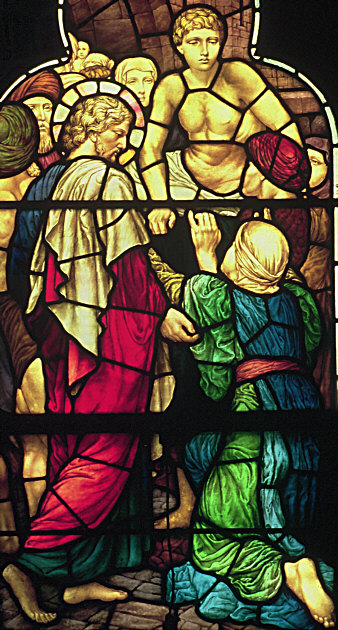 |
Jesus
Performing
a Miracle
|
The source events of miracles might be acts of God mediated by quantum events. Or they might be direct acts of God. Either way, the observing a true miracle we accord the event that is at the root of the miracle its very existence by witnessing to the miracle. Hence we could call "genesis by accordance" instead "genesis by witness," at least when it applies to miracles.
I intend "genesis by witness" as it applies to miracles to imply the equivalent of "
strong genesis by accordance." For instance, if we assume that at the root of a miracle is (whether or not it is mediated by a quantum event or some such naturalistic thing) an act of God, our witnessing to the miracle is crucial to the very
existence of the act behind the miracle. This is one case where a tree falling in a forest with no one there to hear it makes no sound.
 |
| At Holy Eucharist |
An analogy comes from the Catholic belief about the nature of sacraments such as that of Holy Eucharist. In the Catholic-style communion/Lord's Supper liturgy, the consecrated bread and wine become — after consecration they
are, in a deeply ontological sense — the body and blood of Jesus Christ. By definition as a sacrament, the consecrated elements are together said to be a visible sign of God's invisible grace.
A priest when he celebrates Mass represents Christ and therefore God at the altar. That's why he cannot accomplish Holy Eucharist alone. There must be at least one other person there — possibly lay, or possibly another priest or "religious" person, such as a nun, deacon, brother, etc. Consecration of the elements by a priest all by himself is invalid.
If we think of a sacrament as a close cousin to a miracle, and if we assume the validity of "genesis by witness," this all makes (some) logical sense. If the priest represents God the Son at the altar, then he is the one person present who is ineligible to witness to the miraculous transformation of the eucharistic elements. A witness to an act is by definition
not the actor himself.
So unless there is someone else present, there is no witness ... and no ontologically forceful "genesis by witness." The elements remain unchanged.
Also note that the act of witness to the holiness of the consecrated elements can be shared among those present at the consecration and those making their witness later on. The consecrated bread, in particular, not consumed at the Mass becomes "reserve sacrament" and is moved to a tabernacle. At a later date, this reserve sacrament can be witnessed to and consumed by those who were absent at the original consecration.
This is in fact what happens on Good Friday each year. On the anniversary of Christ's death on the cross, no consecration is done. But the reserve sacrament from the Holy Thursday celebration the previous day is distributed in the stead of newly consecrated elements. Ontologically, it
is the body of Christ, even if none of the priests and congregants who are present were there the previous day.
In a sense, this is another case of witness to a miracle conferring existence to the miracle's source-event
post facto, or after the fact.
For a miracle is much like the sacrament of Holy Eucharist in being a testament to faith. I accordingly suggest that the "genesis by witness" supposition is applicable to both. If we have faith in a miracle
or a sacrament, it becomes part of our world. We are inalterably changed by our witnessing to either, and so is our universe.
 |
Words
with Power |
In a real sense, such a "genesis by witness" worldview stands in confirmation of the principle that "truth is an act." This was a discovery of the eighteenth-century Neapolitan philosopher Giambattista Vico (see my earlier post
Verum Factum). As Northrop Frye wrote in his study of the Bible,
Words with Power (p. 82):
Vico's axiom was verum factum: what is true for us is what we have made ... a creation in which we have participated, whether we have been in on the making of it or on the responding to it.
We
co-create our world, in other words; if not literally, then simply by means of
how we respond to "objective" reality. (I am now modifying my own text from that earlier post.) Put another way, our
response is itself a world-creative act, a personal participation in the very act of creation which in our more simpleminded moments, if we are religious, we attribute solely to God.
In another passage keyed to Vico's
verum factum axiom (p. 135), Frye says the Incarnation of God in the man Jesus of Nazareth "presents God and man as indissolubly locked together in a common enterprise." That enterprise concerns establishing "the reality of God," which at the end of the Bible
... is manifested in a new creation in which man is a participant [by virtue of his] being redeemed, or separated from the predatory and destructive elements acquired from his origin in nature.
The idea of a "new creation" made real at the end of the Bible's narrative arc, in the Book of Revelation, in which God and man are "indissolubly locked together in a common enterprise," is entirely consistent with a "genesis by witness" worldview.
It is as if our participation, our
witness, is ultimately needed in ontologically establishing, or re-establishing, "the reality of God." That manifestly wasn't so at the beginning of the Bible, in the Book of Genesis, when God created the world alone. It is only the "new creation" which requires the help of — again, in an absolutely ontological sense — our co-creative power through faith and through genesis by witness.















 I was touted onto Deborah Bennett's excellent book
I was touted onto Deborah Bennett's excellent book 





